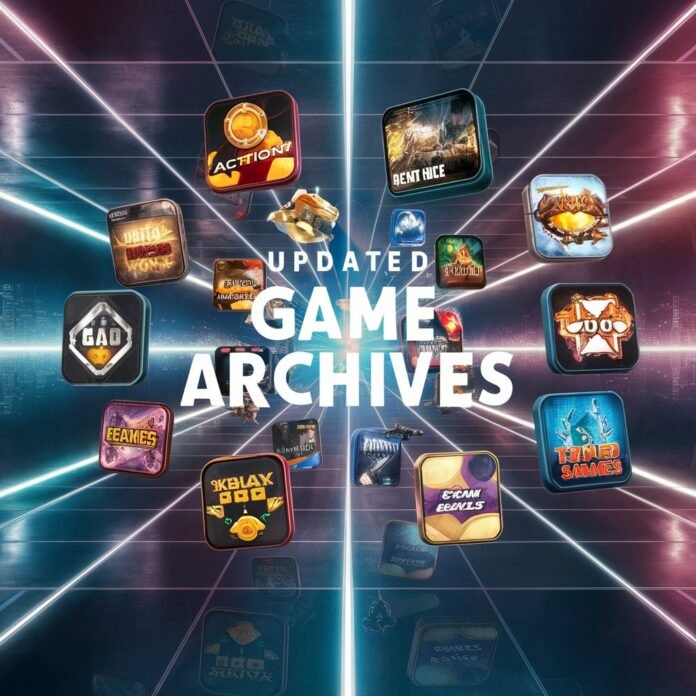Introduction
For gaming enthusiasts, historians, and developers alike, updates thegamearchives stands as a vital repository of digital entertainment’s rich legacy. As technology evolves at a breakneck pace, countless classic games risk fading into obscurity—lost to hardware failures, licensing disputes, or simply the passage of time. TheGameArchives combats this cultural erosion by meticulously cataloging, restoring, and making accessible rare titles from every era of gaming. In this article, we explore the latest updates from this essential project, including newly added titles, breakthroughs in emulation technology, and the ongoing fight to preserve gaming’s most influential works before they disappear forever.
1. New Additions to the Collection: Rare Gems Rescued from Oblivion
TheGameArchives has recently expanded its library with over 50 previously “lost” titles, including obscure arcade cabinets, unreleased prototypes, and regional exclusives that never saw global distribution. Among the highlights is Darkened Skye, a cult-classic GameCube title based on Skittles candy marketing, long thought lost due to licensing issues. Thanks to painstaking negotiations with former developers, TheGameArchives has secured permission to digitally preserve this quirky piece of gaming history. Other notable additions include a near-complete prototype of Sonic X-treme, the canceled Saturn entry that nearly became Sonic’s 3D debut, and Cryogenic: The Sleep, a forgotten survival horror PC game from 1999. Each title undergoes rigorous verification to ensure authenticity before joining the collection.
2. Emulation Breakthroughs: Playing the Unplayable
Many classic games rely on proprietary hardware or defunct operating systems, making them nearly impossible to experience today. TheGameArchives’ engineering team has made groundbreaking progress in custom emulation, developing solutions for notoriously difficult systems like the FM Towns Marty (a Japan-exclusive ‘90s console) and the Action Max (a 1987 VHS-based “console”). Their newest achievement? A software-based decompilation of the Game Boy Advance’s BIOS, allowing legally preserved ROMs to run with near-perfect accuracy without proprietary firmware. These innovations don’t just benefit preservationists—they empower indie developers to study classic coding techniques and adapt them for modern projects.
3. Legal Battles and Ethical Preservation
Game preservation exists in a legal gray area, with corporations often sitting on unused IPs while opposing fan efforts to archive them. TheGameArchives recently faced a DMCA takedown notice for hosting Ultima: The Reconstruction, a fan-made restoration of the 1981 RPG. However, after presenting evidence that the original code hadn’t been sold commercially in over 20 years, the project reached a compromise: the game remains available for research purposes only, with downloads restricted to verified academics and historians. This case sets a potential precedent for fair-use arguments in game preservation, though TheGameArchives’ legal team stresses the need for clearer copyright reforms to protect cultural heritage.
4. Community Contributions: How Gamers Are Helping Save History
Preservation isn’t just the work of archivists—passionate gamers worldwide have contributed to recent successes. A Reddit user’s discovery of Nitro Knights, a canceled Sega CD game, in their uncle’s attic led to a full dump of its source code. Meanwhile, a Patreon-funded initiative has allowed TheGameArchives to purchase and digitize rare physical media, including a $3,000 copy of Magic Knight Rayearth for Saturn (one of only 200 English copies). The team has also launched a “Adopt-a-Game” program, where donors sponsor the preservation of specific titles, receiving detailed reports on the restoration process.
5. The Future of TheGameArchives: VR Museums and Blockchain Verification
Looking ahead, TheGameArchives plans to launch a virtual reality museum where users can “walk through” gaming history, interacting with exhibits like a playable Pong cabinet or a behind-the-scenes look at Half-Life 2’s development. More controversially, they’re experimenting with blockchain-based certification to verify the authenticity of preserved games while allowing original creators to receive royalties—a potential middle ground between preservation and IP ownership. With grants from the Internet Archive and partnerships with universities, TheGameArchives aims to become the definitive academic resource for gaming culture by 2030.
Conclusion: Why Preservation Matters Beyond Nostalgia
TheGameArchives’ work transcends mere nostalgia—it’s about safeguarding an art form that has shaped generations. From Pac-Man’s cultural impact to Deus Ex’s narrative innovations, these games are historical artifacts deserving the same care as films or literature. As physical media degrades and digital storefronts delist titles without warning, projects like this become humanity’s backup drive. Whether you’re a retro gamer, a developer, or simply curious, supporting game preservation ensures future generations can experience the medium’s evolution firsthand.



